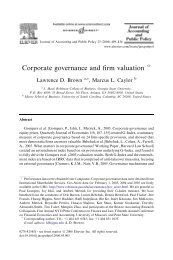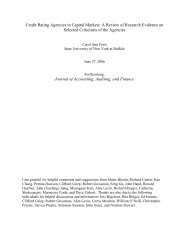Income Dynamics, Economic Rents and the Financialization of the ...
Income Dynamics, Economic Rents and the Financialization of the ...
Income Dynamics, Economic Rents and the Financialization of the ...
Create successful ePaper yourself
Turn your PDF publications into a flip-book with our unique Google optimized e-Paper software.
anking industry that we see longer term shifts in both pr<strong>of</strong>its following <strong>the</strong> 1980 deregulation <strong>of</strong><br />
<strong>the</strong> industry <strong>and</strong> that pr<strong>of</strong>it accumulation accelerated after <strong>the</strong> final 1999 elimination <strong>of</strong> bans on<br />
multiple product finance activity we believe substantially streng<strong>the</strong>ns <strong>the</strong> inference that <strong>the</strong> ob-<br />
served rent process is driven by deregulation produced financialization. The insurance <strong>and</strong> real<br />
estate industries show <strong>the</strong> same basic patterns but <strong>the</strong>y are nei<strong>the</strong>r as strong nor as sustained.<br />
The security, commodity <strong>and</strong> investment industry st<strong>and</strong>s out for being a case <strong>of</strong> employee, ra<strong>the</strong>r<br />
than employer, driven rent extraction.<br />
We think that rent <strong>the</strong>ory is more plausible when <strong>the</strong> evidence includes accounts <strong>of</strong> actual<br />
institutional practices <strong>and</strong> political adjustments <strong>of</strong> market rules that produce (or destroy) income<br />
rents. The introduction <strong>of</strong> an institutional account is we think a useful contribution to market <strong>and</strong><br />
political power based explanations <strong>of</strong> rent, since <strong>the</strong> actual bases <strong>of</strong> power are revealed ra<strong>the</strong>r<br />
than assumed. In presenting this institutional account we think we have discovered ano<strong>the</strong>r mod-<br />
ification to rent <strong>the</strong>ory, which we think <strong>of</strong> as a multi-actor path dependent alternative to simple<br />
power stories. Because rent <strong>the</strong>ory has typically not observed <strong>the</strong> institutional process, it has<br />
been able to tell a simple single actor market power story such as banks control <strong>the</strong> government<br />
(Crotty 2009). What we observe is a more complex path dependent process, in which low bank<br />
pr<strong>of</strong>its in <strong>the</strong> high inflation 1970s coupled with consumer dem<strong>and</strong>s for higher interest rates led to<br />
<strong>the</strong> initial deregulation <strong>of</strong> <strong>the</strong> industry. In <strong>the</strong> 1980s <strong>and</strong> 1990s <strong>the</strong> rise <strong>of</strong> institutional investors<br />
fueled financial innovation in <strong>the</strong> deregulated industry. The 1999 repeal <strong>of</strong> Glass-Steagall con-<br />
straints on finance sector service coupling led to <strong>the</strong> creation <strong>of</strong> <strong>the</strong> giant multi-service bank<br />
holding companies that dominate US financial markets <strong>of</strong> all types. By <strong>the</strong> 2000s <strong>the</strong> search for<br />
ever exp<strong>and</strong>ing pr<strong>of</strong>its generated <strong>the</strong> real estate bubble to provide mortgages to feed a completely<br />
unregulated market in mortgage based securities <strong>and</strong> <strong>the</strong>ir risk hedging partners credit default<br />
38







